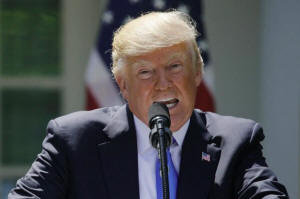|
U.S. seeks to dismiss lawsuit against
Trump over foreign payments
 Send a link to a friend
Send a link to a friend
 [June 10, 2017]
By Dan Levine [June 10, 2017]
By Dan Levine
(Reuters) - The U.S. Department of Justice
on Friday called for the dismissal of a lawsuit alleging President
Donald Trump violated the constitution by accepting foreign payments at
his hotels.
The lawsuit, filed in January, said Trump violates the Constitution's
"emoluments" clause, which bars him from accepting gifts from foreign
governments without congressional approval, by maintaining ownership
over his business empire despite ceding day-to-day control to his sons.
In a filing in Manhattan federal court on Friday, the justice department
argued that the plaintiffs in the case - an ethics non-profit,
restaurant group and hotel events booker - do not have legal standing to
sue.
The government also said payments to Trump's hotels do not qualify as a
violation of the emoluments clause, which is intended to cover personal
services performed by the president.
"Plaintiffs' broad-brush claims effectively assert that the Constitution
disqualifies the president from serving as president while maintaining
ownership interests in his commercial businesses," the department said
in its court filing.

A spokesman for ethics watchdog Citizens for Responsibility and Ethics
in Washington, one of the plaintiffs, did not immediately respond to a
request for comment.
The lawsuit said businesses such as hotel bookers are injured when
foreign governments try to "curry favor" with Trump by favoring his own
enterprises.
It said this had even occurred since Trump took office, when China
granted him trademark rights after he pledged to honor the "One China"
policy of his White House predecessors.
[to top of second column] |

President Donald Trump responds to a reporter's question during a
joint news conference in the Rose Garden at the White House in
Washington, U.S. June 9, 2017. REUTERS/Jonathan Ernst

The DOJ on Friday said any payments to Trump's restaurants in New
York, a city with 24,000 restaurants, have not caused enough
specific harm to plaintiffs to give them the ability to sue.
U.S. District Judge Ronnie Abrams, an appointee of former Democratic
President Barack Obama, oversees the litigation.
(Reporting by Dan Levine in San Francisco; Editing by Clarence
Fernandez)
[© 2017 Thomson Reuters. All rights
reserved.]
Copyright 2017 Reuters. All rights reserved. This material may not be published,
broadcast, rewritten or redistributed.

 |